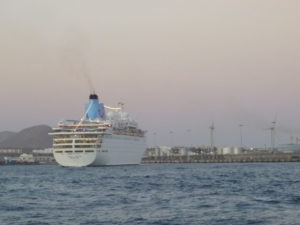 Day 1: Wednesday 6th December
Day 1: Wednesday 6th December
With the three horn blasts of the Tui cruiser, we abandon the calibration of the wind vane in the harbour and hotfoot it out into the Atlantic pursued by a reversing cruise ship. An inauspicious departure heralded by the skipper blowing Pantelisa’s wheezing plastic horn.
The sun was advancing ahead of us into the west and Arrecife was retreating behind, the ocean expanding its vastness ahead and astern. To the starboard were the lights of Lanzarote and then, further south, Fuerteventura. Close enough for comfort and data signal well into the next morning.
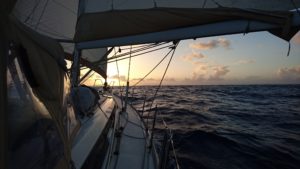 This was it. ‘Atlantic Crossing’ had been half-heartedly on my bucket list for more than 10 years. I never really thought it would become a reality, and to be honest, it was just something drummed up while chewing the end of a pencil, trying to think of worthy endeavours to fill the void of a broken marriage. So here it was. List item becoming reality once again, as Glee had become less than two years before.
This was it. ‘Atlantic Crossing’ had been half-heartedly on my bucket list for more than 10 years. I never really thought it would become a reality, and to be honest, it was just something drummed up while chewing the end of a pencil, trying to think of worthy endeavours to fill the void of a broken marriage. So here it was. List item becoming reality once again, as Glee had become less than two years before.
Day 2: Thursday 7th December
The wind had increased to 25 knots making for a steep and confused sea with waves coming from all directions. The waves and wind conspired to turn Pantelisa into the wind and rattle the sails and rigging. We reduced sail by reefing the main and increased a little in the Genoa to balance a little better, which it does but still not perfect.
Our spell ashore has reset Herbert’s seasickness tolerance back to zero and he waits for the effect of the medication to kick in. Other than taking time and rest, there is not much he can do about it.
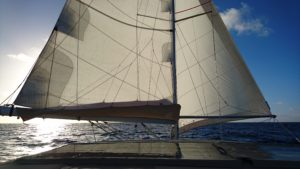 The autopilot can’t cope with its two adversaries, the waves and the wind. It puts us into a gybe and the wind backing around the mainsail issues a violent bang as the boom is restrained by the preventer line and the sail suddenly bulges in the opposite direction. Human intervention is required. We can at least see the approach of the waves from astern and start the recovery turn before the wave arrives. It takes constant concentration and physical effort.
The autopilot can’t cope with its two adversaries, the waves and the wind. It puts us into a gybe and the wind backing around the mainsail issues a violent bang as the boom is restrained by the preventer line and the sail suddenly bulges in the opposite direction. Human intervention is required. We can at least see the approach of the waves from astern and start the recovery turn before the wave arrives. It takes constant concentration and physical effort.
We goose wing the sails and run more with the wind. The autopilot doesn’t get it and wants to gybe and head into the wind. We are now rolling from side to side more now the wind is no longer holding us over. Our mast is like the inverted pendulum of a metronome and the movement a challenge to Herbert’s seasickness.
The autopilot situation is untenable. It takes great effort as a trio to keep Pantelisa on course. Herbert is learning fast on the helm but is prone to overcompensate when steering to the compass, so duties fall on me and Thomas until we divine the secret of Pantelisa’s balance in the wind. We reef the Genoa and tighten it hard so it is less prone to flapping when the wind takes us. Other than that there is little improvement. Day 2 into a 21-day voyage. It feels like we have set off on a marathon at a sprint and I wonder how far we can get before fatigue wipes us out and we have to heave to or sail off course at an angle to the wind in order to get some sleep.
Thomas searches the settings on the Raymarine autopilot and in desperation, presses the ‘Reset to Factory Settings’ option. It’s better, much better. Only we’ve lost the sensitivity option where we can define how hard or easy the autopilot works so we can save power. Changing course slightly to put the gybing point further out of reach, we do not yet trust the autopilot and take it in turns to eat while one of us stays on the helm.
The waves are relentless and take Herbert by surprise knocking his dinner off the table into the seat. Another wave pushes into a gybe as the autopilot attempts to respond in time.
An awful night of hand steering for four hours. It could only have been worse if it was raining. That was the only positive I could take from the experience. I did not Gybe but was spun windward a few times by the steep waves that seemed to arrive in teams of between 3 and 7. This sea state was beyond Herbert’s current skill level at compass based helming and Thomas took his shift.
Day 3: Friday 8th December
I emerged from my cabin at 08:00, after a three-hour sleep, to relieve Thomas of his double shift. Thomas had an idea: drop the mainsail and leave the Genoa up. It made sense to me on a logical level but Thomas was hesitant since Jimmy Cornell, founder of the “Atlantic Rally for Cruisers (ARC)” had advised never to sail without the main so you could sail in any direction in an emergency. We were desperate so…
We had to head into the wind to bring the sail down and the sea and wind were particularly hostile as our speed in the water minus wind speed changed to speed through the water plus wind speed as we changed course.
The banging of the bow into the waves and the water coming over the deck brought Herbert out of his cabin to see what was happening, just in time to help with the halyard. Thomas was wrapped around the swinging mast in the sea spray pulling down the sail and I went out to help him tie it down to the boom. Returning to the shelter of the cockpit made the mission feel like we had been out on a spacewalk out of the space shuttle.
Resuming course with a reefed Genoa and no mainsail, the transformation was astounding. Pantelisa was now perfectly balanced and now had stability: easy to steer, even in the steepest waves. Even the autopilot was happy and resumed its competence. Plus we were still making 7 knots speed.
The night watch was far more relaxing this time. I steered for three hours and allowed the autopilot an hour while I could sit back and enjoy the moonlight over the heaving black mountain range of the Atlantic.
Day 4: Saturday 9th December
I emerged from my cabin into a granite grey sky, over an industrial slate grey sea. The milky white sun strained through the cloud around noon but gave up its pitiful struggle soon after. Steering was easy but tedious after about an hour. Nothing to fix a sight on to use as a bearing, no boat traffic, only numbers on a compass swinging to and fro with the game to keep the needle on 240.
I envisioned a sumptuous dinner of Egg, chips, beans and mushrooms. Something different from the sauce based pasta and rice that conveniently was served in pans and bowls. That was the plan I was looking forward to. It was a disaster, the gas could not heat the oil enough for fries and the potatoes melted into an oily mash that stuck to the bottom of the pan. Egg, mushrooms, beans and pasta in a bowl wasn’t quite what I had in mind but we were famished and wolfed it down. The only food we left was the oily mash stuck to the pan.
I was feeling the fatigue as the alarm woke me for my midnight shift and I stumbled out of my cabin dragging my deep sleep with me. It was hard to keep balance as I stepped into the cockpit and I was on the back foot when it came to getting up to speed with the current status. Our course was 247 and the Genoa was reefed to the first marker and as tight as a drum. “Safer in the prospects of a gybe.”
Thomas said I could let some more sail out if the wind eased. Unlikely, I thought as the wind whistled past my ears and I could see our speed over ground indicator nudging 8 knots. I steered for maybe twenty minutes before making tea and grabbing some biscuits. The wind wasn’t cold but I felt it, and folded a blanket around me. I let the autopilot steer the rest of my shift.
Day 5 Sunday 10th December
Waking with heavy eyes in the light of day, I could feel the fatigue maintaining its grip, due to the constant movement of the animated sea. The floor of my cabin covered with clothes and things that flung themselves off cupboards during the night. The swish of my washbag on the top of my locker as it slid back and forth to the rhythm of the Atlantic swell kept me hovering on the border of sleeplessness.
Where is the phone? There it is over the other side of the bed sliding back toward me as the port side takes another heaving swell from the east.
My heavy eyes read for a short while, losing half the words they send to my tired brain.
I postpone venturing out on deck, trying to reclaim some energy from lack of sleep. It doesn’t work: a mental form of seasickness where it is not the body reacting but consciousness itself.
I start my computer to catch up on the rough drafts of blog posts hastily scribbled on paper. 77% the Lenovo battery icon tells me. Maybe an hour to craft an approximation of elegant writing – it will be rough but at least it will BE. It will exist.
Electricity is at a premium, we can’t just plug in when we want. The solar panels turned away from the sun by the angle of the wind starve our batteries of charge while the oscillating autopilot sucks away at the voltage.
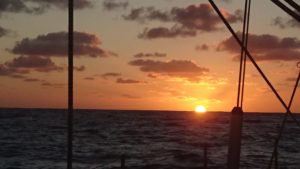 Phone at 72% fares better in airplane mode and used almost entirely for telling the time and sounding an alarm for the start of the night watch… If it were not for the phone, I would not know what day it is. One day leads seamlessly into another, light and dark undefined by sleep cycles.
Phone at 72% fares better in airplane mode and used almost entirely for telling the time and sounding an alarm for the start of the night watch… If it were not for the phone, I would not know what day it is. One day leads seamlessly into another, light and dark undefined by sleep cycles.
The 5th day. It could be the 10th. Land is a distant memory in such a short space of time. It’s gone noon when I emerge from my cabin into the cockpit. Thomas and Herbert are already there. I apologise for being late, not that there is any obligation or time frame other than the night watches we set our selves. The sun is bright and the wind and waves have eased. Perfect sailing and we are still at about 6 knots speed.
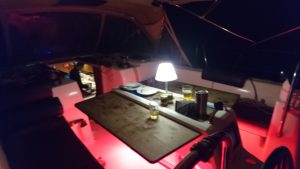 By late afternoon I feel more energised. Partly because of writing earlier gave me a sense of accomplishment and partly by just relaxing in the sun in calmer weather expended less energy in order to remain upright. At 5 pm Thomas suggested I take more rest and that made a big difference. I slept well for a couple of hours and woke for dinner before returning to bed again at 21:00.
By late afternoon I feel more energised. Partly because of writing earlier gave me a sense of accomplishment and partly by just relaxing in the sun in calmer weather expended less energy in order to remain upright. At 5 pm Thomas suggested I take more rest and that made a big difference. I slept well for a couple of hours and woke for dinner before returning to bed again at 21:00.
The forecast predicts strong wind from the east north of Cape Verde. We could save miles and time by turning west early as long as the winds do not lead us into a calm. We turn west. We wouldn’t be visiting Cape Verde…
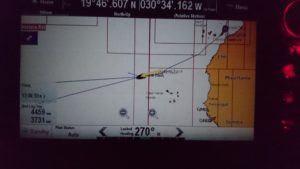



Working as a team, camadarie and just supporting one another through difficult weather and the problems you endure makes for great reading. As an ex night nurse I know that fatigue, which after a difficult shift and lack of sleep, it makes you feel like a zombie. Your colleagues can make a real difference if you all look out for each other. As a trio that bond is essential….